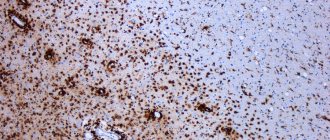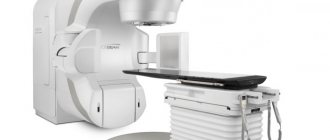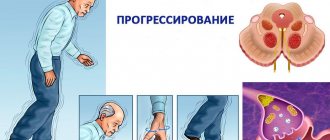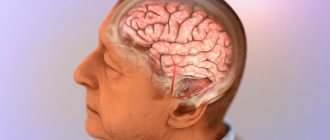Alzheimer's disease (otherwise known as senile dementia of the Alzheimer's type) is a lesion of the nervous system in which a person gradually loses mental abilities: memory, speech, the ability to think logically and navigate. This disease is considered one of the most severe forms of senile dementia.
Research shows that the cause of the disease is the disruption and subsequent death of neurons, the key cells of the central nervous system.
At-risk groups
The exact causes of Alzheimer's disease have not yet been established. Scientists today consider hereditary predisposition to be the key factor influencing its appearance. The genes responsible for the occurrence of this form of dementia have already been discovered. There is also a relationship between the disease and brain injuries and tumors, hypothyroidism, and exposure to toxic metals.
With Alzheimer's disease, changes occur in the structure of the brain at the cellular level - some nerve cells die, and glomeruli and plaques form from them, which disrupt the integrity of the nerve pathways and prevent the conduction of impulses along them. Such structures first accumulate in the parts of the brain responsible for memory and learning, and then spread to other areas, leading to an intensification of existing symptoms of the disease and the appearance of new ones.
It is curious that people engaged in intellectual work develop Alzheimer's disease much less frequently. Scientists attribute this to the formation of more nerve connections between brain cells. Thanks to multiple spare connections, the conduction of impulses along the nerve pathways does not stop even in the event of loss of function of individual neurons.
What does life expectancy depend on?
As stated earlier, the key factor determining how many years an Alzheimer's patient will live before death is drug therapy, but other incentives can also help extend lifespan:
- Proper care. Very often, the true cause of death in patients with Alzheimer's is concomitant diseases, such as pneumonia, bedsores, leading to sepsis. With proper care, they can be avoided, which means the likelihood of death is reduced.
- Comfortable social conditions. The more stressful situations that arise in a person's life, the more nerve cells die daily. As a result, depression of brain activity occurs much faster, which means that a severe degree of the disease occurs earlier.
- Proper nutrition. For normal nutrition of brain tissue, it is extremely important to receive large amounts of vitamins and beneficial nutrients. It can be difficult for an elderly person to independently provide himself with a complete five-a-day diet.
- Physiotherapeutic procedures. They are important for ensuring normal blood supply. In hospitals and boarding houses, acupuncture, aromatherapy, music therapy and other procedures are often prescribed.
In other words, the life expectancy of Alzheimer's patients is influenced by the environment around the patient. A calm, measured life and regular communication with other people have a positive effect on brain activity, which means they reduce the rate of development of the disease from the first stages to the last.
Important! If relatives and friends objectively cannot provide proper care, it is better to seek help from specialists.
Prevalence
Alzheimer's disease is most often found in people over 65 years of age, but in rare cases, earlier onset occurs. According to statistics, the number of patients is increasing from year to year, which is associated not only with improved diagnosis, but also with a general increase in people’s life expectancy. If in 2006 almost 27 million people worldwide suffered from Alzheimer's disease, by 2050 this figure could quadruple. Women are slightly more likely to be diagnosed with senile dementia of the Alzheimer's type, but this may be due to their longer average life expectancy.
Causes of dementia
The pathogenesis of Alzheimer's disease remains a controversial topic in the medical community. Long-term studies have not revealed a correlation between the external environment and the likelihood of developing senile dementia. The pathology develops against the background of the formation of accumulations of beta-amyloid - they are called senile plaques. An increase in the amount of beta-amyloid leads to the death of neurons. Based on this fact, doctors have developed three main hypotheses about the causes of Alzheimer's disease.
The first assumption is based on a deficiency of acetylcholine in the body of patients. The second hypothesis is based on the assumption that people suffering from dementia have a congenital defect on chromosome 21, which is responsible for encoding the protein from which beta-amyloid is formed. Proponents of the third theory assume that accumulations of tau protein form in neurons. This substance prevents the exchange of impulses between neurons and provokes their gradual extinction.
Signs
The course of Alzheimer's disease varies from person to person, but as a rule, it develops unnoticed and gradually progresses. The first symptoms are often ignored, considering a person’s strange behavior to be age-related or an atypical reaction to stress.
At the very beginning of Alzheimer's disease, patients experience short-term memory disorders - they forget what happened recently, but remember well events that happened 20-40 years ago. Gradually, long-term memory begins to suffer, and patients lose self-care skills. Ideas about safe behavior also suffer, which can cause premature death.
Common symptoms of Alzheimer's disease include:
- unreasonable anxiety;
- depression;
- delusional ideas;
- inability to recognize familiar objects and faces;
- forgetting individual words;
- violation of orientation in space and time;
- indifference to events happening around;
- problems with gait;
- inability to make decisions.
Behavior change is something that relatives of an elderly person should pay attention to first. The sudden transformation of a calm and balanced uncle into a “daredevil,” as well as the grandmother’s refusal of long-loved hobbies and activities, are a cause for concern and a visit to a neurologist.
Diagnostic measures
In the pre-dementia stage, diagnosis remains unlikely. Identifying signs of Alzheimer's disease in a person is possible by undergoing extensive neuropsychological testing. During it, patients are offered various tasks aimed at determining the degree of preservation of higher nervous functions.
During a preventive examination and history taking, a neurologist can refer the patient for hardware studies: EEG, CT and MRI of the brain. Positron emission tomography makes it possible to detect accumulations of beta-amyloid in the patient’s brain structures. Analyzes of the cerebrospinal fluid give similar results. It is collected during a lumbar puncture.
Stages of Alzheimer's disease
Experts divide the course of Alzheimer's disease into 4 stages:
- predementia;
- early dementia;
- moderate dementia;
- severe dementia.
Symptoms of pre-dementia are often mistaken for natural aging of the brain, and yet they can be detected 8 years before the clear manifestations of Alzheimer's disease. The patient is unable to assimilate new information, remember a common word, or perform tasks of average complexity that he previously did almost on autopilot. People with the early stages of Alzheimer's disease have problems with planning tasks, abstract thinking, and lose flexibility in decision making.
During early dementia, memory impairment becomes more noticeable, although memories from the distant past are still not affected. Problems with speech may begin - a person begins to speak more slowly, his vocabulary becomes poorer, and it becomes more difficult to express his thoughts both orally and in writing. At the same time, the patient is still completely adequate. The accuracy of operations that require small movements suffers: drawing, writing, embroidering, fastening buttons. The person becomes awkward, clumsy. He continues to do many things on his own, but still needs regular supervision.
In moderate dementia, speech impairments are already quite noticeable - the patient forgets the appropriate words, tries to find a replacement for them with a similar meaning, but is often mistaken. Coordination of complex movements, reading and writing suffers, and urinary incontinence develops. Long-term memory deteriorates, a person may forget where he is, the way home, the faces of relatives. At this stage of the disease, the patient may become aggressive and irritable.
Severe dementia is an extreme degree of illness when the patient cannot control himself independently and is completely dependent on the help of others. His speech is very meager; as a rule, it comes down to individual words that are not always used appropriately. In some cases, there is a complete loss of speech function. At the same time, the ability for emotional contact is preserved - the person understands the emotions addressed to him and can even reciprocate.
In the last stage of Alzheimer's disease, the patient is in a state of apathy and powerlessness, although aggression may occasionally persist. Typically, such people lose the ability to independently make any movements, and self-care skills completely disappear. They mostly lie in bed, stop eating on their own and quickly lose weight. Death occurs from additional complications: pneumonia, infection of bedsores, etc.
What do Alzheimer's patients die from?
Alzheimer's disease and death are not always directly related. In the first 3 stages, the patient more often dies from concomitant diseases resulting from poor care. The most popular among them are: pneumonia, sepsis, necrotic lesions due to bedsores, and various infections. You can avoid them if you constantly look after the patient and show him to the doctor.
Things are different for those patients who are already at the last stage of the disease. In this case, the cause of death in Alzheimer's disease is that a large number of senile plaques have accumulated in the brain, and the tissue itself has become like a sponge. Neural activity simply could not continue, which is why the death of the organism occurred.
It is impossible to stop the process today. Drugs are effective in slowing the progression of the disease only in the first three stages. When the fourth occurs, the remaining time counts down to weeks. Without the help of a doctor, patients die from Alzheimer's in just a couple of months.
Diagnostics
People with Alzheimer's disease come to the attention of a psychiatrist and neurologist. At the first stage, it is important to collect an anamnesis about how the disease developed over time and to identify the presence of a hereditary predisposition.
To make a correct diagnosis, it is necessary to conduct a full examination and exclude diseases with similar symptoms (Parkinson's disease, Huntington's disease, tumors, hypothyroidism, cerebral atherosclerosis, etc.).
The examination must include:
- general blood analysis;
- hormonal status of the thyroid gland;
- blood test for HIV and syphilis;
- magnetic resonance imaging of the brain;
- electrocardiogram;
- electroencephalography;
- cerebrospinal fluid analysis.
In addition, there are special tests to test short-term memory, attention, speech, and self-care skills. They help determine the stage of Alzheimer's disease.
The diagnosis of Alzheimer's disease is made only after excluding diseases with similar symptoms. Mandatory diagnostic criteria are the gradual development of symptoms of dementia and progressive deterioration of memory. The diagnosis can be definitively confirmed by post-mortem histological examination of brain tissue under a microscope.
How long do sick people live?
It is quite difficult to definitively answer the question of how long people with Alzheimer’s disease live. It depends on the age at which the disorder was discovered, gender, and measures taken to eliminate symptoms. But Alzheimer's disease and life expectancy are certainly linked:
- As the disease progresses, more and more areas of the brain are affected, causing it to stop functioning.
- Persons with severe forms of the disorder often create dangerous conditions for themselves and those around them: they injure themselves, leave home and find themselves unable to return.
- To treat symptoms, medications are used that have a large number of side effects, which means they are harmful to the body to some extent.
The age at which it is detected has a decisive influence on life expectancy in Alzheimer's disease. If the disorder appeared at the age of 60-65 years and the patient immediately began to receive good medical care, he can live for about another 20 years. Most of the time will be spent in the first stages of the disease, so life will be relatively normal.
If the disease manifests itself by age 70-75, the transition to severe disease will be faster, so death from Alzheimer's will most likely occur within 10 years. Half the duration of the disorder may occur in the final stages, so that the patient will require constant supervision quite soon.
If the disorder appears at the age of 80-90 years, life expectancy will be no more than 5 years. At this age, the brain already has senile changes, so the disorder will immediately manifest itself as severe. Such patients quickly become bedridden and require intensive care.
Important! Sometimes Alzheimer's is detected at the age of 50, but this does not mean that a person will be able to live normally for another 30 years. Most likely, the development of the disease will be rapid and death will occur within 10-15 years.
Treatment
Unfortunately, there is no cure for Alzheimer's disease or slow the progression of the disease, but medications can help relieve symptoms. To correct cognitive impairment, drugs from the group of cholinesterase inhibitors (physostigmine, galantamine, proserine) and memantine are prescribed. Antipsychotics are used for aggression, psychosis and behavior problems, although their long-term use in dementia increases the mortality rate.
A very important aspect of the rehabilitation of patients with Alzheimer’s disease is psychosocial support, training relatives in behavioral tactics and care skills. A sick person should not feel like a heavy burden or disabled. Art therapy, hippotherapy, music therapy, etc. can be used as an auxiliary treatment.
Treatment of the disease
Drug and physiotherapeutic methods of treating Alzheimer's disease do not provide a cure or slow down the rate of its progression. The treatment protocols followed by the clinics are aimed at relieving symptoms and improving the quality of life of people suffering from dementia.
Pharmacological support for patients is based on doctors’ assumptions about the reasons for the formation of senile plaques. The drugs offered to sick individuals are aimed at reducing the likelihood of massive death of neurons due to the formation of beta-amyloid and tau protein deposits on their surface.
Psychosocial therapy plays a significant role in maintaining the quality of life of patients. Doctors help sick people adapt to the disease. In the later stages of dementia, psychotherapists use art therapy, sensory integration techniques, and memory stimulation.
This approach does not allow achieving significant improvements in the patients’ condition, but it helps to normalize their mood and alleviate certain everyday problems.
Forecast
It has been established that patients suffering from Alzheimer's disease live shorter lives than their peers. The average life expectancy after diagnosis is about 7 years. The mortality rate is increasing due to the increased number of injuries, falls, traffic accidents and other accidents. In 70% of cases, patient death occurs due to the development of Alzheimer's disease itself - due to dehydration or pneumonia.
Recommendations for relatives
The burden of care and responsibility for the health of a person with Alzheimer's disease falls primarily on loved ones. Most patients prefer to live within the walls of their own home rather than a nursing home, and this requires the creation of special conditions, changes in the routine and habits of the family.
It’s hard for loved ones to watch how the disease progresses and their loved one changes. The most correct thing in this situation would be to seek professional help from a psychotherapist who works with this group of patients. Many people find it helpful to communicate with relatives of other patients: it allows them to learn from experience and receive the necessary emotional support.
The Mednavi company cooperates with leading neurological centers in Russia and the world. We know where to turn for help and will help organize treatment. Take advantage of our knowledge and experience, contact a Mednavi specialist.
Everything you wanted to know about Alzheimer's disease but were afraid to ask
Did Dr. Alois Alzheimer, a German psychiatrist of the 19th and 20th centuries, imagine that the disease named after him would acquire such impressive proportions just a century later?
However, the fact remains: according to statistics, this pathology occurs in approximately 47% of people who have reached or exceeded the age of 85 years. Research by the World Health Organization indicates a gradual aging of the world's population. It is not difficult to understand that the percentage of people suffering from Alzheimer's disease will only increase.
So what is this disease?
Alzheimer's disease is a condition that affects mental functions such as thinking, memory, and behavior.
What can be considered risk factors?
• age over 65 years. Starting from this age stage, for every 5 years, the risk of the disease increases by 2-2.5 times;
• floor. This pathology is more often observed in women;
• heredity. The risk of getting sick increases if any of your relatives suffer from Alzheimer's disease;
• the presence of hypertension increases the risk of developing the disease by 1.5 times;
• diabetes mellitus and atherosclerosis.
What are the causes of the disease?
There are several hypotheses explaining the development of the disease.
The pathological process is associated, in particular, with two types of proteins: beta-amyloid and tau protein. Beta-amyloid, accumulating in the brain tissue between nerve cells (neurons), forms a kind of “plaques”. Tau protein with an altered structure forms clusters in the neurons themselves. Both of these factors presumably lead to disruption of the functioning of nerve cells and, ultimately, to their death.
Symptoms of Alzheimer's disease
Forgetfulness is common to all people. Moreover, forgetting is completely normal. But sometimes forgetfulness is a symptom of trouble. It also occurs in Alzheimer's disease. However, is the mere fact of the presence of this symptom sufficient to make a diagnosis? No. Therefore, the peculiarity of memory loss, as well as the presence of other manifestations, is fundamentally important. Memory in this disease deteriorates steadily, and short-term memory suffers primarily.
Other important signs are:
• forgetting places, people, and the sequence of certain events;
• difficulties in performing usual tasks;
• communication problems;
• changes in character, mood, isolation from loved ones;
• visual perception changes, which can be expressed, for example, by difficulties in explaining the image seen.
Over time, symptoms become more pronounced and their number increases.
Manifestations of the disease may first be noticed not by the patients themselves, but by those around them. What should you do if you have witnessed changes that may indicate the onset of Alzheimer's disease in your loved one? In this case, it is important to convince the person to see a doctor.
What specialty does a doctor treat Alzheimer's disease?
The answer to the question depends on at what stage of the disease the patient sees the doctor. Often the first specialist may be a general practitioner or internist. If neurological and psychiatric manifestations are detected, the patient is referred to appropriate specialists. Since the detected symptoms may be a manifestation of not only Alzheimer's disease, the neurologist prescribes studies to rule out these diseases.
If there is a violation of the actual mental functions, the patient is treated by a psychiatrist.
What is the life expectancy of people with Alzheimer's disease?
It is impossible to answer this question precisely because the answer depends on many factors.
So, the moment of onset of the disease matters: if it occurs before the age of 60, a person can live 15-20 years. If the disease strikes at a later age, then this period is correspondingly reduced.
Connection with gender. Men with Alzheimer's disease have been shown to live shorter lives than women.
A significant factor that has a negative impact on the life expectancy of patients with Alzheimer’s disease is the presence of a chronic disease, often several, in the patient.
Despite the fact that specific treatment for this pathology has not yet been developed, regular activities aimed at maintaining a person’s physical fitness and mental capabilities are important. What exactly can be done?
Treatment of Alzheimer's disease at home
• establish proper nutrition for the patient. It must be balanced in the content of proteins, fats, carbohydrates, vitamins and minerals. It is necessary to include in the diet foods containing so-called omega-3 fatty acids (for example, vegetable oil, salmon, sardines). Another important component in nutrition is the so-called folate. Their role is to slow the development of atherosclerosis, another risk factor for Alzheimer's disease. Folates are found, in particular, in cabbage, dried beans, spinach;
• communicate with a sick person. The fact of his possible removal from you should not be an obstacle to communication: remember that this is a manifestation of the disease;
• stimulate the mental activity of a person with Alzheimer's disease. This includes, for example, reading and methods for improving memorization. It is important to master new types of activities that the patient has not previously engaged in and which he would do with pleasure. For example, learning a foreign language, mastering a musical instrument, drawing, sculpting;
• provide the patient with physical activity. Exercises are selected by a specialist taking into account the physical capabilities of a particular person;
• for prevention and in the event of mental disorders, psychological help and psychotherapy may be needed;
• taking medications. Drugs for the specific treatment of Alzheimer's disease are under development. However, there are a number of drugs that can reduce the symptoms of the disease.
Remember - despite the seriousness of the disease, the patient can be helped to improve the quality of life and prolong it.










